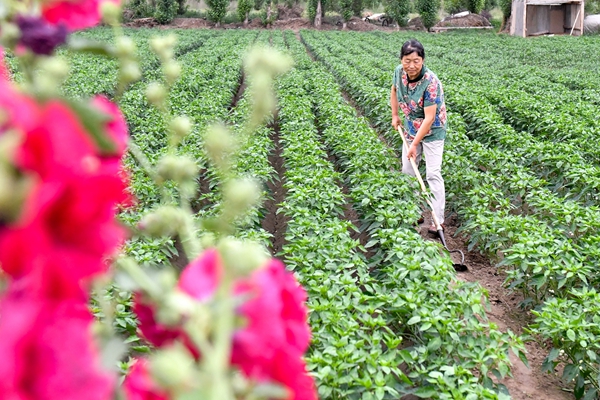

Li Yihua and his wife, Zhao Liwei, have been engaged in the chili industry in Kailu county, North China's Inner Mongolia autonomous region, for nearly 20 years.
As an entrepreneur, Li mainly imports chili seeds from the Republic of Korea and exports fresh chilies to the country. With the advent of the peak chili export season, tonnes of chilies have been kept neatly piled up in their yard.
"Business is good. We export more than 4,000 tons of fresh chilies a year and earn more than 200 yuan ($31) per ton," says Zhao.
"I can speak Korean fluently, which helps me a lot in dealing with clients," says Li, who is an ethnic Korean in China.
Kailu county has a history of growing chilies spanning more than 30 years. "The advantages of abundant sunlight and a significant temperature difference between day and night make the county highly suitable for chili cultivation," says Yu Xiaoxiang, a local agronomist.
Currently, Kailu has around 40,000 hectares dedicated to chili cultivation, about one-third of the county's arable land. Each year, 30 of its major chili farming cooperatives export more than 15,000 metric tons of chilies to over 10 countries in Europe and Asia.
To better develop the chili industry, in 2013, Kailu spent 200 million yuan on the construction of the largest chili trading center in North China. A total of 21 cold storage units were built across the county, capable of storing 100,000 tons of fresh chilies for offseason sales.
Meanwhile, to extend the industrial chain and make more money from the chilies, Kailu has set up 15 enterprises to process chilies into various products like chili sauce, chili powder, and ingredients used in lipsticks and medicines.
Annually, the 15 enterprises can process 140,000 tons of chilies, with a sales volume exceeding 2 billion yuan.
High value-added products rely on good quality chilies. In recent years, Kailu has been striving to strengthen technical training among chili growers.
As well as door-to-door visits, agronomist Yu Xiaoxiang and his colleagues also record videos covering various topics like methods for nurturing seedlings, fertilization and pest control, and post them on short-video platforms.
"Such online training is more convenient, as chili growers have easy access to the information," says Yu. "Over the years, the chili industry has greatly increased the income of the locals. The chili has truly spiced up their lives."
A rural resident removes weeds in a chili field in Kailu county, Inner Mongolia autonomous region, in July. Growing chili is a pillar of the local agricultural industry and has helped to improve people's income.